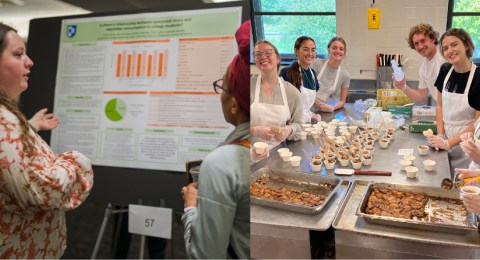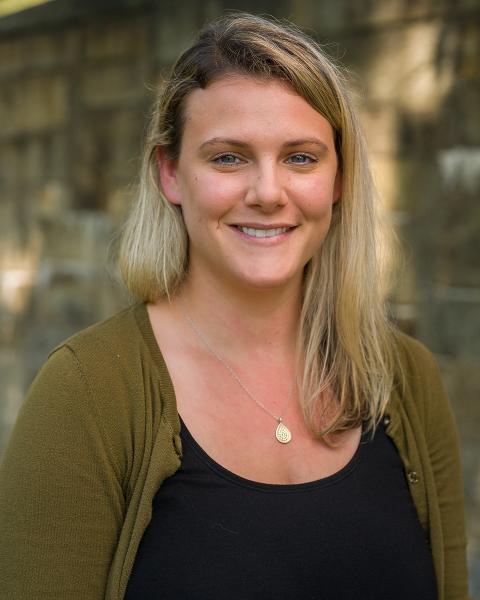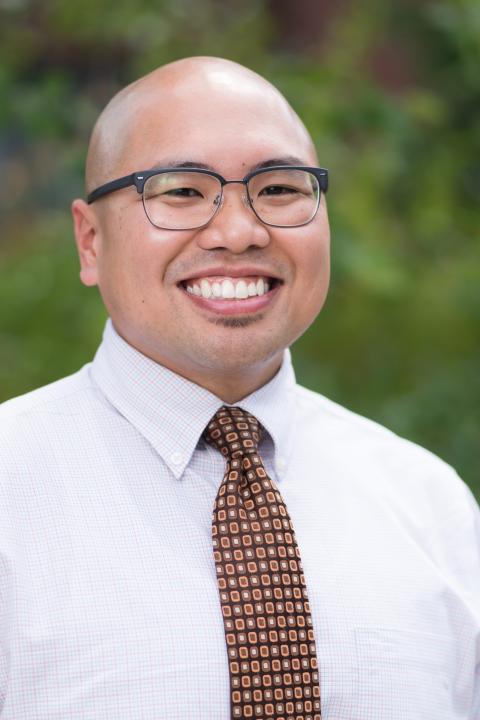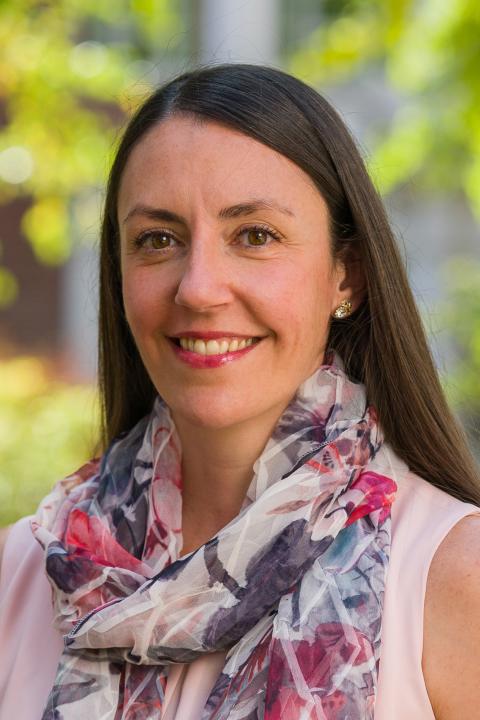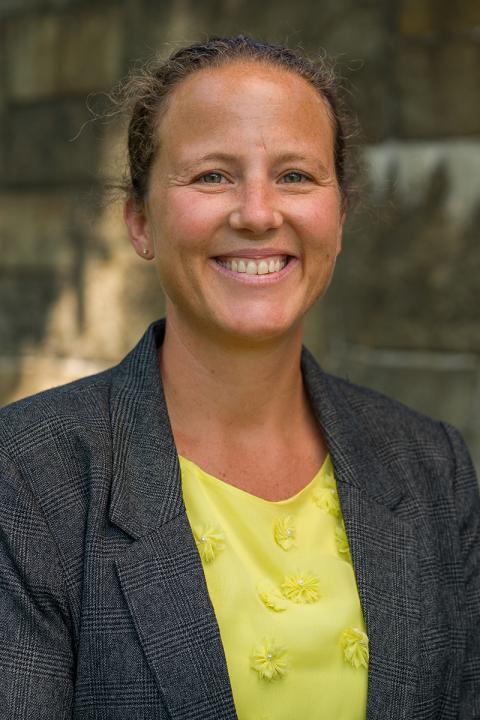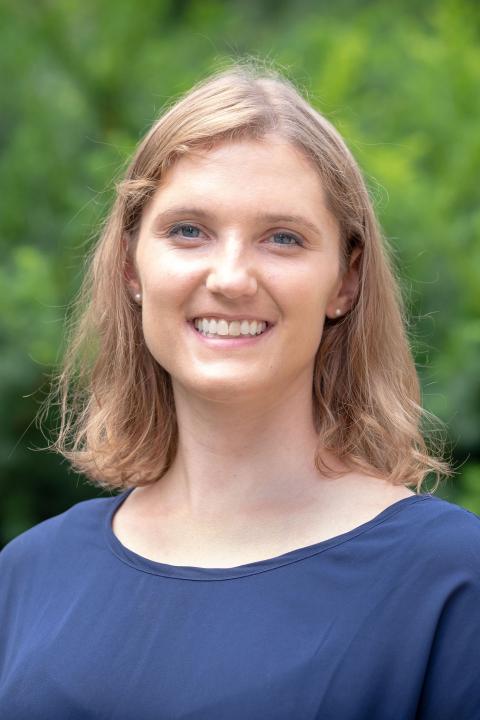Throughout our four-semesters of Master of Science in Nutrition and Dietetics (MSND) program you will receive focused guidance from experienced mentors and earn real-world experience in specialized practicums as you prepare for a career in many areas of dietetics including clinical nutrition, community programming and food service management. Upon completion of the program, graduates are eligible to sit for the Registered Dietitian Nutritionist exam.
Stipend: $10,000 | Courses: 13 | Program Length: 4 semesters
About the Nutrition and Dietetics program
Why pursue a Nutrition and Dietetics Master's at UNH?
The Master of Science in Nutrition and Dietetics program offers individualized mentorship by dedicated faculty and preceptors. Students gain hands-on experience through coursework and practicums which build on foundational knowledge. Students learn how to evaluate the nutritional status of patients, develop nutrition care plans, assess the impact of nutrition intervention on patient health, and provide nutrition education to individuals and groups. Students develop strong critical thinking skills and are able to analyze the literature to promote evidenced based care. Students also learn about the management of food production and delivery systems, as well as the broad food system environments in which dietitians work.
Program Highlights
- Teaching experience during the first year that pays students a stipend of $10,000.
- An average, first time pass rate for the national RDN exam of over 90% and a 100% pass rate within one year of first attempt.
- State-of-the-art simulation lab where students can hone their clinical and counseling skills ahead of their internship experiences.
- Dynamic and interdisciplinary department that includes experts in sustainability, agriculture, nutrition, food systems, and animal sciences.
- Curriculum incorporates elective options to allow students to individualize their experience to support their professional aspirations.
- Located in the beautiful and convenient Seacoast area of New Hampshire. Located just 30 minutes from the beach and 1.5 hours from the white mountains.
Potential career areas
- Clinical nutrition
- Community nutrition
- Education/teaching
- Food service management
- Food systems and sustainability
- Industry
- Nutrition counseling
- Public health
- Program development
- Research
Curriculum & Requirements
The Master of Science in Nutrition and Dietetics is designed as a 4-semester program of required coursework and supervised practice rotations. We invite new students to begin each Fall semester. Upon conclusion of the program, our graduates are eligible and well-prepared to take the Registered Dietitian Nutritionist (RDN) exam. Our program’s RDN exam pass rates well exceed the national average for both first attempt and passing within one year of first attempt.
The first year of the curriculum is comprised of academic course work that integrates supervised experiential learning, the core of which focuses on culinary skill development, nutrition counseling, clinical care and research. The program's second year includes practicum-based supervised experiential learning in a variety of clinical, community, and food service operations rotations integrated with curriculum-related coursework. The program is responsible for finding high-quality supervised experiential learning rotation sites and student’s preferences and professional goals are strongly considered when assigning rotations.
Admission Requirements
- Applicants must have a minimum of a 3.0 GPA.
The Master of Science in Nutrition and Dietetics program at the University of New Hampshire is currently granted accreditation by ACEND of the acend@eatright.org, 120 South Riverside Plaza, Suite 2190 Chicago, IL 60606-6995.
Degree Requirements
The Master of Science in Nutrition and Dietetics requires that students complete required coursework, including over 1,200 hours of practicum-based learning and related course work in food service, community and clinical experiences. The competencies integrated into the program reflect those established by ACEND.
Students must earn a B- or better in graduate courses to earn credit toward the degree.
| Code | Title | Credits |
|---|---|---|
| Required Courses | ||
| NUTR 829 | Dietetics: Intro to Dietetics Principle and Practice 1 | 2 |
| NUTR 831 | Dietetics: Clinical Theory and Practice | 10 |
| NUTR 832 | Dietetics: Food Service and Community | 10 |
| NUTR 836 | Sustainable Food Systems and Culinary Arts Practicum | 3 |
| NUTR 855 | Concepts and Controversies in Weight Management | 4 |
| NUTR 860 | Behavioral Nutrition and Counseling | 4 |
| NUTR 876 | Advanced Pathophysiology and Clinical Care | 4 |
| NUTR 960 | Research Methods in Nutritional Science I | 4 |
| NUTR 961 | Research Methods in Nutritional Science II | 4 |
| ANFS 901 | Introduction to Agriculture, Nutrition, and Food Systems Graduate Studies | 1 |
| Electives | ||
| Select two courses (for a minimum of 4 credits) from the following: | ||
| NUTR 809 | Nutritional Epidemiology | 4 |
| NUTR 810 | Advanced Diabetes Care | 2 |
| NUTR 815 | Advanced Sports Nutrition | 4 |
| NUTR 830 | From Seed to Sea: Examining Sustainable Food Systems | 4 |
| NUTR 840 | Nutrition for Children with Special Needs | 4 |
| NUTR 850 | Nutritional Biochemistry | 4 |
| NUTR 851 | Nutritional Biochemistry of Micronutrients | 4 |
| NUTR 895 | Investigations | 1-4 |
| NUTR 927 | Nutrition and Gut Microbes in Human Health | 4 |
| ANFS 850 | Food system solutions; increasing sustainability and equity | 4 |
- 1
NUTR 829 is taken twice for a total of 4 credits.
Program Learning Outcomes
Competency for Registered Dietitian Nutritionists (CRDNs) Explained
UNH’s Master of Science in Nutrition and Dietetics accreditation agency, ACEND, requires that the curriculum covers certain competencies which are “specific knowledge, skills, values, and behaviors required for effective performance as a practitioner.” These are identified as CRDNs (Competency for Registered Dietitian Nutritionists). Each required non-elective course will contain CRDNS, some of which may be tracked by the instructor and program. A complete list of the required CRDNs are as follows:
Domain 1. Scientific and Evidence Base of Practice: Integration of scientific information and translation of research into practice.
- CRDN 1.1 Select indicators of program quality and/or customer service and measure achievement of objectives.
- CRDN 1.2 Evaluate research and apply evidence-based guidelines, systematic reviews and scientific literature in nutrition and dietetics practice.
- CRDN 1.3 Justify programs, products, services and care using appropriate evidence or data.
- CRDN 1.4 Conduct projects using appropriate research or quality improvement methods, ethical procedures and data analysis utilizing current and/or new technologies.
- CRDN 1.5 Incorporate critical-thinking skills in overall practice.
Domain 2. Professional Practice Expectations: Beliefs, values, attitudes, and behaviors for the professional dietitian nutritionist level of practice.
- CRDN 2.1 Practice in compliance with current federal regulations and state statutes and rules, as applicable, and in accordance with accreditation standards and the Scope of Practice for the Registered Dietitian Nutritionist, Standards of Practice, Standards of Professional Performance, and Code of Ethics for the Profession of Nutrition and Dietetics.
- CRDN 2.2 Demonstrate professional writing skills in preparing professional communications.
- CRDN 2.3 Demonstrate active participation, teamwork and contributions in group settings.
- CRDN 2.4 Function as a member of interprofessional teams.
- CRDN 2.5 Work collaboratively with NDTRs and/or support personnel in other disciplines.
- CRDN 2.6 Refer clients and patients to other professionals and services when needs are beyond individual scope of practice.
- CRDN 2.7 Apply change management strategies to achieve desired outcomes.
- CRDN 2.8 Demonstrate negotiation skills.
- CRDN 2.9 Actively contribute to nutrition and dietetics professional and community organizations.
- CRDN 2.10 Demonstrate professional attributes in all areas of practice.
Domain 3. Clinical and Customer Services: Development and delivery of information, products and services to individuals, groups, and populations.
- CRDN 3.1 Perform Medical Nutrition Therapy by utilizing the Nutrition Care Process including use of standardized nutrition terminology as a part of the clinical workflow elements for individuals, groups and populations of differing ages and health status, in a variety of settings.
- CRDN 3.2 Conduct nutrition focused physical exams.
- CRDN 3.3 Perform routine health screening assessments including measuring blood pressure, conducting waived point-of-care laboratory testing (such as blood glucose or cholesterol), recommending and/or initiating nutrition-related pharmacotherapy plans (such as modifications to bowel regimens, carbohydrate to insulin ratio, B12 or iron supplementation).
- CRDN 3.4 Provide instruction to clients/patients for self-monitoring blood glucose, considering diabetes medication and medical nutrition therapy plan.
- CRDN 3.5 Explain the steps involved and observe the placement of nasogastric or nasoenteric feeding tubes; if available, assist in the process of placing nasogastric or nasoenteric feeding tubes.
- CRDN 3.6 Conduct a swallow screen and refer to the appropriate health care professional for full swallow evaluation when needed.
- CRDN 3.7 Demonstrate effective communication and documentation skills for clinical and client services in a variety of formats and settings, which include telehealth and other information technologies and digital media.
- CRDN 3.8 Design, implement and evaluate presentations to a target audience.
- CRDN 3.9 Develop nutrition education materials that are culturally and age appropriate and designed for the literacy level of the audience.
- CRDN 3.10 Use effective education and counseling skills to facilitate behavior change.
- CRDN 3.11 Develop and deliver products, programs or services that promote consumer health, wellness and lifestyle management.
- CRDN 3.12 Deliver respectful, science-based answers to client/patient questions concerning emerging trends.
- CRDN 3.13 Coordinate procurement, production, distribution and service of goods and services, demonstrating and promoting responsible use of resources.
- CRDN 3.14 Develop and evaluate recipes, formulas and menus for acceptability and affordability that accommodate the cultural diversity and health needs of various populations, groups and individuals.
Domain 4. Practice Management and Use of Resources: Strategic application of principles of management and systems in the provision of services to individuals and organization.
- CRDN 4.1 Participate in management functions of human resources (such as hiring, training and scheduling).
- CRDN 4.2 Perform management functions related to safety, security and sanitation that affect employees, clients, patients, facilities and food.
- CRDN 4.3 Conduct clinical and client service quality management activities (such as quality improvement or quality assurance projects).
- CRDN 4.4 Apply current information technologies to develop, manage and disseminate nutrition information and data.
- CRDN 4.5 Analyze quality, financial and productivity data for use in planning.
- CRDN 4.6 Propose and use procedures as appropriate to the practice setting to promote sustainability, reduce waste and protect the environment.
- CRDN 4.7 Conduct feasibility studies for products, programs or services with consideration of costs and benefits.
- CRDN 4.8 Develop a plan to provide or develop a product, program or service that includes a budget, staffing needs, equipment and supplies.
- CRDN 4.9 Engage in the process for coding and billing for nutrition and dietetics services to obtain reimbursement from public or private payers, fee-for-service and value-based payment systems.
- CRDN 4.10 Analyze risk in nutrition and dietetics practice (such as risks to achieving set goals and objectives, risk management plan, or risk due to clinical liability or foodborne illness).
Domain 5. Leadership and Career Management: Skills, strengths, knowledge and experience relevant to leadership potential and professional growth for the nutrition and dietetics practitioner.
- CRDN 5.1 Perform self-assessment that includes awareness in terms of learning and leadership styles and cultural orientation and develop goals for self-improvement.
- CRDN 5.2 Identify and articulate one's skills, strengths, knowledge and experiences relevant to the position desired and career goals.
- CRDN 5.3 Prepare a plan for professional development according to Commission on Dietetic Registration guidelines.
- CRDN 5.4 Advocate for opportunities in the professional settings (such as asking for additional responsibility, practicing negotiating a salary or wage or asking for a promotion).
- CRDN 5.5 Demonstrate the ability to resolve conflict.
- CRDN 5.6 Promote team involvement and recognize the skills of each member.
- CRDN 5.7 Mentor others.
- CRDN 5.8 Identify and articulate the value of precepting.
Professional Licensure/Certification Disclosures
The University of New Hampshire offers a number of academic programs designed to lead to professional licensure or certification in New Hampshire. However, completing a UNH degree/program does not guarantee professional licensure or certification. Eligibility may also depend on factors like years of work experience, professional examinations, passing a background check, and other criteria.
UNH does not guarantee that its professional licensure programs will satisfy the criteria of professional licensure boards in other states. Some states maintain different requirements for professional licensure or certification and requirements can change frequently. Federal regulations require the University to make public disclosure of certain information regarding professional licensure or certification programs, regardless of the modality the program is offered (i.e., in-person or online). The University provides guidance below but recommends students contact their state/territory licensing or certification board to ensure a program meets specific state/territory requirements.
Visit the Office of the Registrar's website for information about whether this program meets professional licensure requirements in your state.
Deadlines
The UNH Master of Science in Nutrition and Dietetics (MSND) accepts applicants through the Fall and Spring ACEND application cycles with all admitted applicants enrolled in the subsequent Fall semester. Once a completed application for the UNH MSND is received, the application will be reviewed and the applicant will be invited to a virtual interview. Admitted students are required to submit a deposit towards their first semester tuition to secure their spot and must rescind applications to other programs. Please contact Dr. Amy Taetzsch for questions or clarifications.
Prospective students applying to the UNH MSND via the ACEND application cycle submit their application via the DICAS portal according to the below dates. The DICAS application process allows applicants to submit their application to UNH and any other programs that participate in this nationally-based application process. More information on the ACEND national application process can be found here.
| ACEND Application Cycle Dates for Class of 2026-28 | Fall Cycle | Spring Cycle |
| Application opens | August 5th | August 5th |
| Preferential deadline to submit completed application | October 5th | February 1st |
| Acceptance offer notification begins | November 1st | March 1st |
| Final deadline to submit completed application | December 15th | June 15th |
Prospective candidates who are currently enrolled or recently graduated from the University of New Hampshire can apply to the UNH MSND in their Junior, Senior year or soon after graduation with acceptance occurring through rolling admission.
Application fee: See DICAS for Application Fee
Campus: Durham
New England Regional: No
Accelerated Masters Eligible: No
New Hampshire Residents
Students claiming in-state residency must also submit a Proof of Residence Form. This form is not required to complete your application, but you will need to submit it after you are offered admission, or you will not be able to register for classes.
Transcripts
DICAS will require official transcripts to be uploaded to your portal.
Letters of recommendation: 3 required
Recommendation letters submitted by relatives or friends, as well as letters older than one year, will not be accepted.
It is encouraged that applicants have letters of recommendation from both a supervisor and professor.
Personal Statement
Prepare a brief, 1000 words or less, but careful statement regarding:
- Why do you want to enter the dietetics profession?
- Discuss experiences that have helped to prepare you for your career.
- What are your short-term and long-term professional goals?
- What are your strengths and areas needing improvement?
- Why are you interested in the UNH MS in Nutrition and Dietetics?
Resume
A current resume summarizing all volunteer and work experience is required.
Important Notes
All applicants are encouraged to contact the MS in Nutrition and Dietetics Director, Dr. Amy Taetzsch directly to discuss program specific application questions.
International Applicants
International applicants must have their education reviewed by an identified, independent non-profit organization to verify it is equivalent to US regionally-accredited college or university. Once verified, these international applicants are eligible to apply to the UNH MS in Nutrition and Dietetics program through ACEND application cycles. For more information please visit ACEND’s information for international students.
Prospective international students are required to submit TOEFL, IELTS, or equivalent examination scores. English Language Exams may be waived if English is your first language. If you wish to request a waiver, then please visit our Test Scores webpage for more information.
Explore Program Details
Estimated Expenses
The estimated cost for tuition and fees for the full four semester program is $33,930 for in-state students, and $36,770 for out-of-state students. Students requiring health insurance will pay an additional $4,560 for coverage during the 21-month span of the program.
Additionally, students receive a teaching assistant stipend for $10,000 during their first year.
| Estimated 4-Semester Program Costs | In-State | Out-of-State |
|---|---|---|
| Tuition and Fees | $35,577 | $38,570 |
| Health Insurance | Varies | Varies |
| Textbooks | ~$305 | ~$305 |
| Background Checks and Drug Screens | Typically covered by program | Typically covered by program |
| Vaccinations and Titers | Varies | Varies |
| Academy of Nutrition and Dietetics Student Membership | $116 ($58/year) | $116 ($58/year) |
| CPR Certification | Typically covered by UNH | Typically covered by UNH |
| Professional Liability Insurance | Covered by UNH | Covered by UNH |
| Transportation (required for second year practicum rotations) | Varies | Varies |
| UNH Parking Permit | $250 ($125/year) | $250 ($125/year) |
| Rent and Living Expenses | Varies | Varies |
Financial Aid
For more information on the status of financial aid eligibility, please contact the Financial Aid Office for additional information (862-3600) or visit the graduate school website.
UNH Office of the Registrar can provide documentation of full-time status if needed.
The Master of Science in Nutrition and Dietetics program encourages all interested candidates to join us for a virtual open house to learn more about our program
Please join us for one of our virtual open houses:
- Friday, September 12th from 11a-12p ET, register here
- Thursday, January 15th from 12:30-1:30p ET, register here
We also accommodate in-person and virtual meetings with current students and/or the MSND Director. For more information, please contact Dr. Taetzsch.
We look forward to meeting you!
What dietetic internship practicum sites does UNH offer, and how are placements decided?
Food Service Management (~ 6 weeks): All students are assigned to the award-winning UNH Dining Services Team for their food service rotation.
Community (~ 8 weeks): Students will be placed at two community sites to ensure they experience a variety of community work within the program. The MSND team has strong relationships with many community organizations including The NH Food Bank, Cooperative Extension, outpatient practices specializing in areas such as diabetes and eating disorders, UNH Athletics, Special Olympics, education in local schools, and many more.
Clinical (~ 13 weeks): Students spend a semester working with dietitians at an area hospital such as Concord Medical Center, Maine Medical Center, Wentworth-Douglass Hospital (an MGH Affiliate Hospital), Exeter Regional Hospital, Portsmouth Regional Hospital, Dartmouth Hitchcock Medical Center, and Lawrence General Hospital. We currently place students at two level 1 trauma centers and all students are guaranteed most of their clinical rotation be in 100+ bed hospitals. There are opportunities for areas of interest such as NICU, CCU, and Oncology at one or more of our hospital sites.
Elective (2 weeks): Interns have the opportunity to expand upon an interest area with an elective rotation prior to graduation. Prior placement sites include Fresenius Dialysis clinics, Bariatric clinics, Sports nutrition, local nursing homes, and WIC.
The MSND team considers several factors when deciding what sites to match interns with, including:
- Availability of sites and preceptors
- Intern's interest areas and professional aspirations
- Intern's academics performance and past work/volunteer experience
Can students have outside employment?
In the first year, students have the opportunity to work as Teaching Assistants and earn over $10,000. Many interns have outside employment during the 1-month winter break and 3-month summer breaks.
Students are discouraged from working during the fall and spring semesters of their first and second year of the program. Past experiences have demonstrated that students who work during the program have difficulty completing the requirements of the program in a timely and satisfactory manner.
If you choose to seek additional employment, you'll need to arrange your schedule around classes and practicum hours. Note that there may occasionally be some night and weekend work hours required for the internship.
Do I need prior teaching experience to be a Teaching Assistant?
No prior teaching experience is required to be a Teaching Assistant. Faculty regularly meet with Teaching Assistants to support them in being successful in their roles and strengthening their pedogeological skills.
What does the internship look for when selecting interns?
We use a weighted average method to help guide the review of each applicant with the following criteria:
1. Activities & Experience: 40% (including work/volunteer experience - with an emphasis on dietetics related, honors/awards, leadership roles, extracurricular activities etc.)
2. GPA: 30%
3. Letters of Recommendation: 20%
4. Personal Statement: 10%
I am a graduate of the UNH Dietetic Internship and I need a verification statement. How do I go about obtaining one?
Please send your request for verification statements to amy.taetzsch@unh.edu. Please include any forms that were given to you. We will need the year you graduated from the internship, your date of birth, middle initial, and your maiden name (if applicable) per the Academy of Nutrition and Dietetics. (If you would rather not send this information via email, you may call us). Requests for verification statements may take up to 5 business days. If your verification statement is for licensure in New Hampshire, it is important to note that the Licensure Board meets quarterly, so even though the request has been submitted in a timely fashion, you may not receive a New Hampshire License right away.
Does UNH provide any guidance on housing?
Housing resources for graduate students can be found: https://www.unh.edu/housing/housing-options/graduate-housing
The Master of Science in Nutrition and Dietetics at the University of New Hampshire is currently granted accreditation by the Accreditation Council for Education in Nutrition and Dietetics (ACEND) of the Academy of Nutrition and Dietetics as a Dietetic Internship. The next program review is scheduled for Fall 2027. ACEND is a specialized accrediting body recognized by the Commission on Recognition of Postsecondary Accreditation and the United States Dept of Education.
Additionally, our program has applied to the Accreditation Council for Education in Nutrition and Dietetics (ACEND) to open a new and innovative program to prepare Registered Dietitian Nutritionists starting August 2026. This new program would allow applicants to apply without a DPD verification statement.
ACEND's phone number is: +1 (800) 877-1600 ext. 5400
email: acend@eatright.org
Accreditation Council for Education in Nutrition and Dietetics
120 South Riverside Plaza, Suite 2190 Chicago, IL 60606-6995

Madison Arno
I recently graduated from the University of Maine in May of 2024 with a Bachelor of Science in Food Science and Human Nutrition. I am continuing my education in the Master of Nutrition and Dietetics with a combined Dietetic Internship. I decided to come to the University of New Hampshire because of the strong sense of community and their pride in academics. After graduation, my goal is to become a registered dietitian in the clinical setting and work with patients in areas such as oncology or renal. In my free time I enjoy being active, cooking, and spending time with my friends and family.

Julia Beliveau
I attended Keene State College and earned a Bachelor Of Science in Nutrition and Dietetics as well as a minor in data analytics in May of 2024. Right now, I am a graduate student in the Master of Nutritional Science and Dietetic Internship program at the University of New Hampshire. I chose this path because food is such a diverse subject and there is always something new to learn! In my professional career, I want to become a Registered Dietitian and use my research based background to help patients make informed decisions. Outside of academics, I love to cook for my family, garden, and eat charcuterie boards with loved ones.

Danielle Brazeau
I graduated from The Pennsylvania State University with a B.S. in Nutritional Sciences, focusing on Nutrition and Dietetics, and I am currently pursuing my Master of Science in Nutrition and Dietetics at the University of New Hampshire. During undergrad, I worked as a research assistant at the Center for Childhood Obesity Research and participated in community programs like SnapEd, teaching kids about nutrition. I also held leadership roles, including president of Penn State’s Student Nutrition Association and was a member of the Leadership Initiative Program. Shadowing at UMass Memorial Medical Center, where I observed both inpatient and outpatient settings, sparked my passion for clinical nutrition. While I’m open to various areas within the dietetics profession, my goal is to become a registered dietitian in a clinical setting, specializing in an area I’m particularly passionate about. In my free time, I enjoy working out, nature walks, trying new restaurants, and spending time with friends and family.

Sophie Callahan
I recently earned my Bachelor of Science in Nutrition and Food Science with a Dietetics Concentration from the University of Vermont, and I’m currently enrolled in the Master of Science in Nutrition and Dietetic Internship (MSDI) program at UNH. During my time at UVM, I participated in several extracurricular activities related to nutrition, including an internship with Common Roots, where I developed nutrition education activities focused on local produce and culinary skills for elementary students. I also interned with a private practice dietitian, creating nutrition content and reviewing client case studies, which gave me valuable insights into private practice operations. Additionally, I was involved with a non-profit club on campus dedicated to ending world hunger, where I managed food prep operations, sourced local produce, and emphasized food safety and sustainability.
As I continue my education through the UNH MSDI program, I’m excited to explore different areas of nutrition, such as pediatric nutrition, sports nutrition, intuitive eating, and nutrition education. My goal is to become a Registered Dietitian Nutritionist and eventually open a private practice to provide inclusive, personalized nutrition care to a diverse patient population.

Elizabeth Carstensen
I am a graduate of the University of Vermont, where I earned a Bachelor of Science in nutrition and food science, with a concentration in dietetics. Through an internship with the organization Common Roots, I furthered my passion for sustainable food systems while teaching middle schoolers about nutrition and how to cook with fresh, seasonal produce. Currently, I am a graduate student at the University of New Hampshire, where I am pursuing a Master of Science in nutrition and dietetics with a dietetic internship. Upon my completion of the program, my goal is to become a registered dietitian working within a community setting. I am excited by event planning, project management, and forming connections with different community members. In my spare time, I enjoy trying new restaurants, as well as spending time with my family and friends.
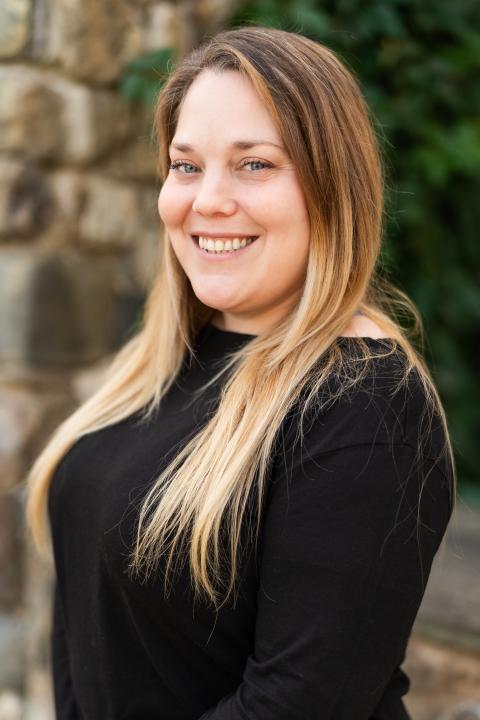
Julia Depuy
Inspired by a life-long passion for food, I traded a corporate office job for a career in health and nutrition. Earning a bachelor's degree in science from the University of New Hampshire, I was fortunate enough to continue at UNH; joining the UNH Master of Science with Dietetic Internship (MSDI) program this fall.
As a graduate student liaison, I’ve had the opportunity to work with several inspiring members of the New Hampshire Academy of Nutrition and Dietetics (NHAND). This organization is dedicated to creating legislation in support of practicing dietitians, partnering with local organizations to spread nutrition education, and bringing awareness and support to the thousands of New Hampshire residents seeking reliable access to healthy food.
I believe that health and nutrition are basic human rights. Through the confidence, education, and experience I’ve gained as a student, I intend to further the efforts of organizations like NHAND through education, policy, community, and clinical nutrition work.

Zoe Dumais
I earned my Bachelor of Science in Dietetics, Nutrition, and Food Sciences from the University of Vermont and am working towards my Master of Science in Nutrition and Dietetics here at UNH. Between my undergraduate and graduate studies, I worked at WIC (the Special Supplemental Nutrition Program for Women, Infants, and Children,) in Providence, RI. There, I gained formative experiences helping low-income families set their young children up for a healthy future. I am passionate about the anti-diet and weight-inclusive approaches to nutrition which are based on the principle that lifestyle behaviors are a better indicator of health than weight. After graduating, I am looking forward to earning my registered dietitian credential and I hope to work in an outpatient counseling setting.

Sae Matsumoto
I earned my Bachelor’s degree in Nutrition: Dietetics at the University of New Hampshire, where I also completed an undergraduate thesis through the Honors program based on an independent research project. Though originally from California, I loved living in New England during my undergraduate years, and I decided to stay at UNH to pursue a Master’s of Science in Nutrition and Dietetics and Dietetic Internship. Currently, my passions are in clinical dietetics, with a focus on maternal and child populations. I believe that food can be preventative medicine, and I am excited to continue learning about this application of nutrition in our lives.
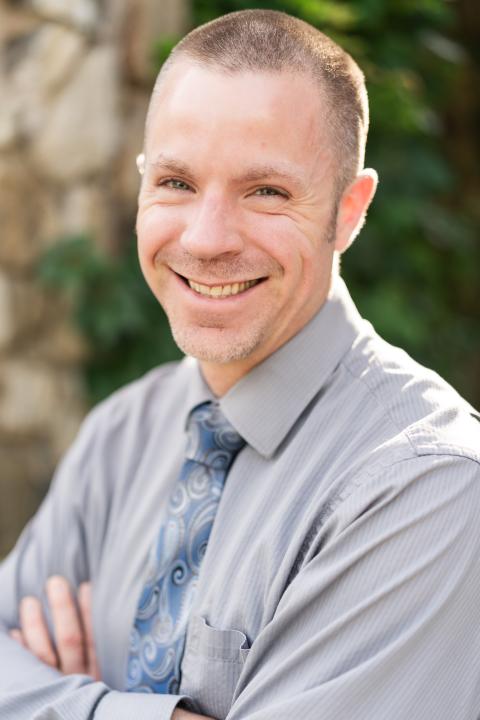
Whitney Robinson
I graduated from the UNH DPD program in 2024 where I earned my Bachelor of Science and I am now working towards my Master of Science in Nutrition as a member of the UNH MSDI class of 2026. Nutrition is a vital part of the healthcare field as well as everyday life, and I hope to use my education to work in an outpatient setting working with adolescents who suffer from disordered eating patterns. Food plays a special role in everyone’s lives and I want to help young adults develop a healthy relationship with food so they can reach their potential. Outside of school, I love spending time with my wife and two kids as well as reading.

Caroline Williams
My name is Caroline Williams, and I am in the MSDI program. I graduated with a Bachelor of Science degree in Nutrition: Dietetics from UNH in the spring of 2024 and I am thrilled to be able to continue my academic journey here. My career goal is to become a Registered Dietitian and a Certified Diabetes Care and Education Specialist (CDCES) to help individuals with diabetes live their happiest and healthiest lives. My passions outside of academics include endurance running, hiking, lounging at the beach, spending time with my friends and family, and reading.
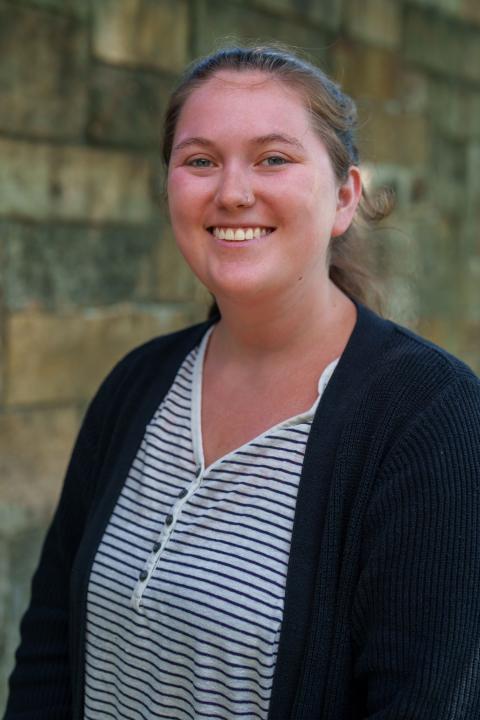
Phoebe Baker (MSND Class of 2025 Alumni)
I graduated from the University of New Hampshire in 2022 with my Bachelor of Science in nutrition and dietetics and am currently pursuing my Master of Science in Nutrition & Dietetics with internship (MSDI). I have always been interested in the human body and how it processes our food for fuel, and this interest is what led me into the field of nutrition. My goal is to become a clinical dietitian working with patients in a hospital setting. I look forward to the clinical portion of the internship and applying the knowledge I have gained while an undergrad. Outside of the classroom, I enjoy being outdoors whether swimming, biking, hiking, or reading in a hammock. I also enjoy traveling and experiencing new foods and cultures.

Elizabeth Barton (MSND Class of 2025 Alumni)
I earned my Bachelor of Science in dietetics, nutrition, and food science from the University of Vermont and am now working to earn my Master of Science in nutrition and complete a dietetic internship at UNH. I have wanted to go into the field of nutrition and dietetics since high school. As I have discovered more niche areas of the field, I have been extremely drawn to clinical pediatrics and NICU care and I hope to eventually work in this area after becoming a registered dietitian. I feel that it is an especially vulnerable time not only for patients but for their families and I would love to work as part of a care team to help support these people during such a difficult experience. In my spare time I love cooking, being outdoors and spending time with friends and family.

Abigail Brown (MSND Class of 2025 Alumni)
I am a recent graduate of Seattle Pacific University in Seattle, Washington where I earned a Bachelor of Science in dietetics and a Bachelor of Arts in honors liberal arts with a minor in sociology. I am currently completing a master's degree at UNH in the nutrition and dietetics program. Before starting my graduate studies, I gained experience working as a nutrition consultant for a disaster preparedness volunteer organization and at a senior living facility. At Seattle Pacific, I had the opportunity to fill leadership positions as a resident advisor and as a planner for the campus's annual Body Appreciation Week, which gave me a deeper appreciation of what it means to value whole-body wellness and share that value with young adults in transitional experiences.
Though I am open to many areas of nutrition, my current area of professional interest is in nutrition counseling, potentially related to disordered eating and body neutrality. Ultimately, I hope to become a registered dietitian and work in a capacity that allows me to help people develop healthy relationships with their bodies and with the food they eat by emphasizing whole-body wellness. Aside from my professional interests, I enjoy propagating and growing house plants and making or appreciating art. As someone who grew up in the Pacific Northwest, I have a deep love for nature and enjoy going on nature walks or learning about native vegetation.
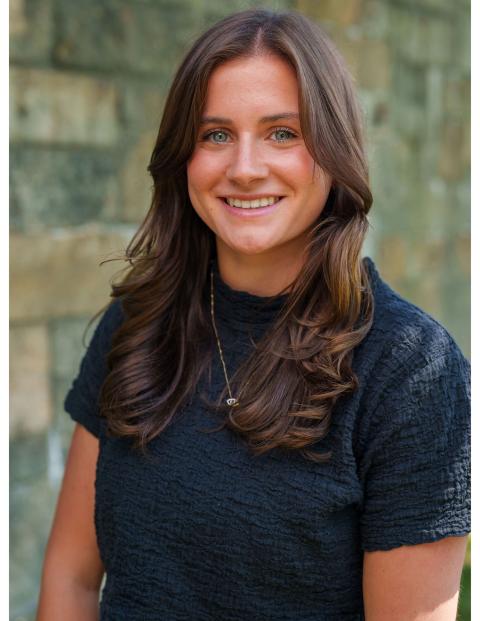
Cassandra Dolan (MSND Class of 2025 Alumni)
I recently graduated from Queens College in Queens, New York with a bachelor’s degree in nutrition and dietetics. I am currently enrolled in the MSDI program here at UNH to earn my master’s degree in preventative disease nutrition, while acquiring expertise in different aspects of dietetics through the internship portion of my program. I have been lucky enough to gain food service and patient care experience while working as a dietetic technician at St. Francis Hospital and Heart Center in Roslyn, New York. I was responsible for educating patients on their nutrition care plans and delivering their meals in a timely manner. This experience helped to establish my passion for dietetics and understand my professional goals.
After graduating from UNH, I hope to become a registered dietitian and continue my work as a professional within community settings to better the food system experience. I believe that the sustainability and quality of our food matters and should be thought of in all food service settings. Outside of my professional career, I enjoy being with my friends and family, spending time outdoors, practicing yoga and getting creative in the kitchen.

Anthony Kyriakides (MSND Class of 2025 Alumni)
I recently graduated from Johnson & Wales University with a Bachelor of Science in dietetics and applied nutrition. I am now a graduate student in the MSDI program at UNH. Prior to attending grad school, I worked in several resorts and spas in pursuit of culinary nutrition opportunities. I never thought the kitchen would become an atmosphere I am so fond of, but now I cannot resist it. I always felt that it is important to be able to "talk the talk" in terms of nutrition, but I should also be able to "walk the walk" in the kitchen. This sets up my current goal to become a chef and registered dietitian and teach culinary nutrition. Cooking is a large part of my life, along with working out, spending time with friends and family and especially Star Wars.

Alanna O'Keefe (MSND Class of 2025 Alumni)
I received my Bachelor of Science in nutrition & dietetics and ecogastronomy from the University of New Hampshire in December 2022. I’ve returned to pursue a master’s degree in nutrition and dietetics. My interest in health and wellbeing drove me to study nutrition during my undergraduate years, during which I developed an appreciation for the interconnectivity between our health and our environment. I have clinical experience working as a nutrition assistant at a Dartmouth-affiliated critical access hospital, which gave me the opportunity to work in a patient-facing role. This experience, alongside my current role as a teaching assistant, solidified my interest in delivering nutrition education. I’m passionate about studying sustainability and love exploring how local food production can craft a sense of community as well as regional resiliency within our food system. I aspire to become a clinical dietitian, yet someday I hope to marry my passions for healthcare and sustainability in an educational role.

Aizhe Qian (MSND Class of 2025 Alumni)
I recently graduated from The Pennsylvania State University with a bachelor's degree in nutrition and a minor in psychology and I'm currently in the Master of Science in nutrition and dietetics program at UNH with the aspiration of becoming a registered dietitian upon completion of my studies. I look forward to using my knowledge and skills in the field of nutrition to raise nutrition awareness, provide evidence-based nutrition support and services and build a healthier food environment to make a positive impact on people's lives.

Claire Reilly (MSND Class of 2025 Alumni)
I recently graduated from Auburn University with a Bachelor of Science in nutrition and dietetics. During undergrad, I explored topics like food insecurity through assisting in research, volunteering at the campus food pantry and repurposing food for my local community. I was drawn to the University of New Hampshire's master's in nutrition and dietetics with internship program due to its unique focus on sustainable food systems, the strong sense of community among the department and the beauty of the New Hampshire seacoast.
My goal is to combine my love for nutrition, food, cooking and the environment to provide hands-on nutrition education to children. I would like to create a nutritional program where children learn to appreciate where our food comes from and what it does for our health, while also learning functional cooking skills to set them up for future success. Outside of nutrition, I love spending time with family, being outdoors and trying new restaurants.

Kelley Shanahan (MSND Class of 2025 Alumni)
I graduated from Keene State College in 2023 with a Bachelor of Science in public health/nutrition as well as sustainability. I am currently a graduate student in the nutrition and dietetics master’s program here at the University of New Hampshire. During my undergraduate studies, I found my passion for sustainable agriculture and food insecurity and how they are both relate to community nutrition. One of my favorite professional experiences was when I worked with Keene Housing. There, I established a youth gardening program in a low-income neighborhood that taught residents how to grow and cook their own food. Additionally, I was a research assistant for Keene State College, studying food insecurity among college-aged students. One of my professional goals is to become a registered dietitian nutritionist. Even though I am currently more drawn to community nutrition, I am open to any of the areas of the dietetic profession. Outside of this program, I enjoy hiking, farming and cooking.

I recently graduated from Keene State College in 2022 with a Bachelor of Science in public health/nutrition. I am currently a graduate student in the master of nutritional sciences with dietetic internship program, where I am expanding my knowledge and engaging in exciting new opportunities. I have experience in food service, leadership and health promotion programming and would like to pursue all those endeavors professionally. After completing this program, my goal is to become a registered dietitian and work with individuals either through private practice or wellness coaching, as well as working within my community through nutrition education and health promotion. I would even like to create my own cookbook one day, as outside of the classroom I enjoy crafting new recipes. Overall, I want to spread accurate nutrition information that inspires others to develop habits to create healthier lifestyles for themselves.
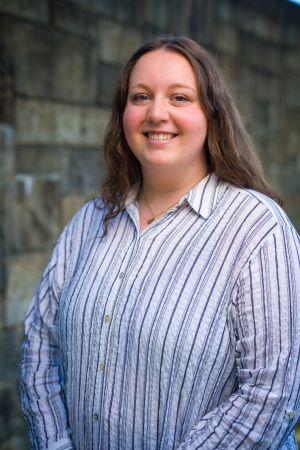
I graduated from the University of Massachusetts Amherst in 2022 with a Bachelor of Science in nutrition within the didactic program in dietetics and a minor in psychology. I am currently completing a master’s in nutritional science and a dietetic internship here at UNH. I’ve known I wanted to go into the field of nutrition since I was in high school but after my experience volunteering with The National Eating Disorder Association and my nutrition counseling class while I was an undergraduate, I knew I was in the right place. After achieving my career goal of becoming a registered dietitian, I would love to work within the field of eating disorder treatment or more generally working with children. In my spare time I love getting outdoors and spending time in nature or learning how to cook a new recipe.

I graduated from the University of California, Davis with a B.S. in clinical nutrition. Now I am on the East Coast as a graduate student at UNH pursuing a master of nutritional science and dietetic internship. There is never a day when I do not talk about food, so nutrition has always been a passion for me. Since then, I gained bits and pieces of experience in the clinical, food service and community settings. My current goal is to become a registered dietitian and work in a clinical setting. The most rewarding part about clinical is seeing patients leaving healthier than when they came in. In my free time, I enjoy hanging out with my friends and family, as well as trying new food places.

I graduated from Ashland University in Ashland, Ohio in the spring of 2022 with a Bachelor of Science in dietetics. I decided to come to the University of New Hampshire because of their unique focus on sustainability and health. So far in this program, I have enjoyed furthering my education in sustainability, volunteering for Gather in the Food Repurposing Project kitchen and working as a teaching assistant. After I earn my master’s degree in nutrition and completing my dietetic internship, I would like to become a registered dietitian and get a job in either cardio nutrition or pregnancy nutrition. In my free time I enjoy running, trying new coffee shops and restaurants and spending time with friends and family.

I grew up in the beautiful mountains of Western North Carolina where I earned my undergraduate degree in nutrition and dietetics from Western Carolina University. Since I was young, I always knew that I wanted to help others lead a more healthy and happy life, but I wasn’t sure what that would look like. It took me until my senior year of high school to find the field of dietetics, but I now feel that this is where I belong. I am currently in my first year of the master of nutritional sciences and dietetic internship here at the University of New Hampshire. The program’s focus on sustainability and creating innovative and open-minded professionals in the field of dietetics is what drew me to UNH. In the future, I plan to continue to travel to different areas and eventually take my knowledge and expertise back to my home state of North Carolina. I do not have a specific career path yet, but I have a passion for public outreach education programs, equal food access and infant/maternal health. As a future registered dietitian, I will strive to share my knowledge of the importance of taking care of our bodies from the inside out. I plan to take a holistic approach by appreciating all parts of overall wellness, including mental, physical and emotional health.

I am a recent graduate of Keene State College where I received a Bachelor of Science in public health nutrition through an accelerated undergraduate program. I am currently completing a master's of nutritional science and dietetic internship at UNH. Before starting my internship, I worked as a nutrition assistant at Cheshire Medical Center assisting patients with meal selection based on specialized diets. Additionally, I held a leadership position in the on-campus food pantry at Keene State College, with a mission to eliminate food insecurity in college students. I had the opportunity to shadow a pediatric dietitian at the Children’s Hospital at Dartmouth, where I discovered my interest in pediatric nutrition, as well as pre-natal and post-natal nutrition. Though I am open to many areas of the nutrition field, my professional goal is to become a registered dietitian nutritionist and see where my experiences at UNH take me. Ultimately, I hope to become a certified diabetes educator. Outside of my internship, I enjoy listening to music and spending time outdoors with my family, friends and my two dogs!

I earned a Bachelor of Science in nutrition: dietetics from the University of New Hampshire and am continuing here in the master of nutritional sciences with dietetic internship program. One of the reasons I chose this program is because it has a focus on sustainability. Not only am I interested in nutrition, but I am also in how to eat more sustainably. My goal after graduation is to become a registered dietitian in the clinical setting but my end goal is to have my own private practice. In my internship, I hope to explore the areas of eating disorders, pediatrics and diabetes. There are so many opportunities as a dietitian, so it is hard to pick one area of focus! I want to help people create healthy relationships with food, so they can eat what they love while feeling their best selves.

I graduated from Kent State University in Kent, Ohio, and earned a Bachelor of Science in nutrition and dietetics. I am currently in the master of nutrition sciences with dietetic internship here at UNH. I was drawn to this program because of its focus on sustainability as well as the unique opportunities offered to us interns. My main goal is to become a registered dietitian. I have many different interests within the field including diabetes education, community outreach and aquaculture sustainability. One day, I would like to start a diabetes education program for low-income people. I would also like to open my own private practice for nutrition counseling. I am very passionate about the happiness and health that we get from food, and I am excited to share that passion.

I graduated from SUNY Plattsburgh with a Bachelor of Science in nutrition on the dietetics track and a minor in chemistry. Before coming to UNH, I spent a few years working at a philanthropic community foundation in the Adirondacks of upstate New York. I worked with their Birth to Three Alliance on grant-funded projects, with the vision to support families with children by ensuring access to services and resources essential for development and distributing of new parent kits. I’m also on the Community Council at the Adirondack Foundation, providing insight on community issues and perspective to the board and staff. After completing the MSDI program, I hope to return to community advocacy, programming and policy as a registered dietician focused on improving food access through sustainable food systems. I'm torn between living in the mountains or near the beach and enjoy reading, swimming, thrift shopping, and cooking.

Sonja Carlson (MSDI Alumni Class of 2023)
I graduated from the University of Arizona and received my bachelor’s degree in nutritional sciences with an emphasis in dietetics. I then decided to move to the East Coast to pursue my master’s and dietetic internship here at UNH. I have been enjoying my time in New England and am excited to take advantage of all that UNH has to offer. In my free time I enjoy running, hiking and mountain biking and am eager to explore the beautiful scenery and outdoors here in New England.

Chelsey Hayes-Marino (MSDI Alumni Class of 2023)
I graduated from the University of New Hampshire with a Bachelor of Science in nutrition: dietetics which solidified my passion for the field of dietetics. Prior to my internship, I worked as a dietetic technician at Maine Medical Center where I was responsible for the initiation of nutritional care plans for patients and providing nutrition education. I worked closely with registered dietitians to ensure that my patients’ nutritional goals were being met while they were in the hospital. My main professional goal is to become a registered dietitian, with a focus in eating disorders and help people improve their lives through nutrition. I want to promote to the public accurate nutrition information that can help people live healthier and happier lives.
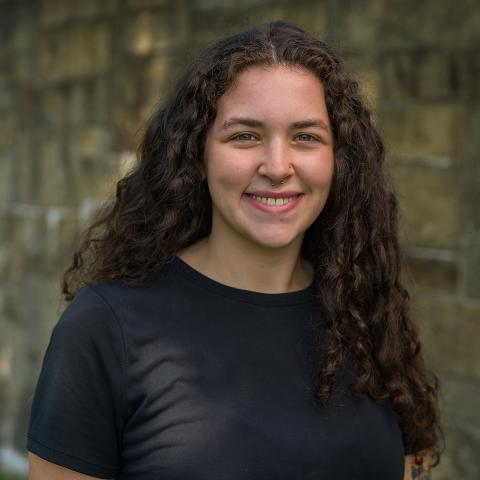
Rebecca Maida (MSDI Alumni Class of 2023)
I am a graduate of Long Island University where I received a B.S. in nutrition and dietetics and a minor in environmental sustainability. I have experience in recipe development and cafe management, and I hope to work in nutrition education both in community and academic settings. When I'm not thinking about food and nutrition I am probably thinking about skateboarding and music. I love listening to hardcore, experimental electronic and indie, and I love to play and write my own music.

Alise Martel (MSDI Alumni Class of 2023)
I am originally from a small town in the northwest corner of Connecticut where I earned my Bachelor of Science in nutrition and dietetics at the University of Saint Joseph. Finding the field of dietetics was not an easy task for me, and I attempted five different career paths prior to nutrition. My goal is to become a registered dietitian nutritionist and work within a field that provides diverse and changing opportunities because of my inability to stay in one place doing the same tasks. I first discovered the field of agriculture and sustainability during my time WWOOFing in Vermont, and I sought out a program with similar focuses. WOOFing stands for World Wide Opportunities on Organic Farms, and provides hands on experience and education in sustainable agricultural practices through volunteering on farms (locally or all around the world) in exchange for things like food, housing, travel, experiences, etc., and can be anywhere from a weekend to months long! This is what brought me to the University of New Hampshire, and I am grateful to be learning in such a welcoming and supportive environment.

Madison McCurdy (MSDI Alumni Class of 2023)
I graduated with my B.S. in dietetics from Montana State University, Bozeman in 2021. I am most excited to gain new experiences in the seemingly endless world of occupations as a dietitian. Based upon my belief that a nutritious lifestyle grows from the ground up, I want to support people in finding their own appreciation for positive food environments, feeling confident in their food choices and strengthening their healthy habits throughout their lives. Using my love of gardening, cooking and assisting others in cultivating their own sustainable nutrition habits and my skills and knowledge as a registered dietitian nutritionist, I hope to one day create an educational community farm.

Victoria Overko (MSDI Alumni Class of 2023)
I graduated from Keene State College and received a Bachelor of Science in public health nutrition in spring of 2021. I am working toward my career goal of becoming a registered dietitian. I’m not sure which area of nutrition I want to focus on but I have a strong interest in eating disorders, sports nutrition and community nutrition and would like to explore the addictions field as well. My passion and interest for nutrition stems from observing the impact that chronic disease has had on my family and the impact that food has had on their health. I hope to make an impact in my professional future as an RD and support people through their food and nutrition journey.

Mallory Robertson (MSDI Alumni Class of 2023)
I earned a Bachelor of Science in nutrition: dietetics from UNH. I found a passion for nutrition after the diagnosis of a nut allergy forced me to be more aware of what I was putting into my body. Since then, I have gained a variety of nutrition-related experiences at locations including DaVita Kidney Care and Nourishing the Northshore. My current career goal is to work in the clinical setting as a registered dietitian in either infant and maternal health or in the treatment of chronic disease. I strive to help people discover the joy in nourishing their bodies and to communicate that food is not only a fuel source but also a form of medicine.
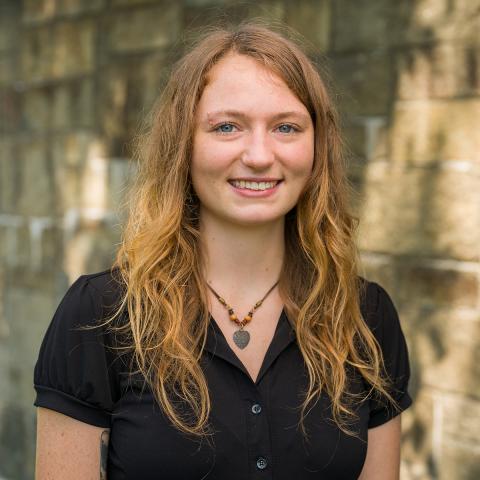
Monica Warren (MSDI Alumni Class of 2023)
I graduated with a Bachelor of Science in nutrition and dietetics and a minor in food and farming from SUNY Plattsburgh in 2020. I am currently completing a master’s in nutritional science and a dietetic internship at UNH. The program's concentration in sustainable agriculture and it’s well-rounded internship is what attracted me the most. My main goal is to earn my Registered Dietitian Nutritionist credential which will bring a wide array of opportunities. I have a background in food service and gardening/farming and am interested in both of these avenues professionally. I would also love to explore pre-/post-natal nutrition and lactation consultation or eating disorders. Healthy food has the power to improve lives, and I would love to share that with my community. In my spare time, I enjoy biking, hiking, cooking, and playing music.

I earned my bachelor’s in nutrition: dietetics here at UNH, but I didn't fully discover my interest in nutrition until my first Intro to Nutrition course. It was then I knew what path I was going to take. I am currently unsure what area of nutrition I want to focus on but I really enjoy clinical because I love being able to interact with people one-on-one and do everything I can to help them feel better. Everyone needs food, so helping people understand what will make them feel their best while still getting to enjoy eating is a great feeling!

I graduated with my B.S. in food and nutrition science from California State University, Chico. I hope that in my career I can help heal people through food and heal people’s relationship with food. I am grateful to be part of a program that will give me the tools and resources I need to help my community in a compassionate and sustainable manner. Currently, I am researching eating competence in first-generation students.

I am from Glendale, Arizona. I earned a degree in nutritional sciences with a minor in women and gender studies and a certificate in food system sustainability from Arizona State University. Due to my interest in nutrition and sustainability, I chose to pursue my graduate degree at UNH. I enjoy being part of the large community here and look forward to applying the skills I’m learning. In the future, I hope to become a registered dietitian nutritionist and pursue a career in public health or teaching. In my spare time, I love to cook, compost and explore the fun, new places New Hampshire has to offer!

I received my bachelor of science in nutrition: dietetics at UNH and am currently a graduate student in the nutritional sciences with a dietetic internship program. I enjoy learning about how specific nutrients impact our health, and I also love eating, cooking, and trying new recipes. The perfect career path for me would be teaching others the importance of nutrition and showing them how to incorporate this knowledge into their own cooking. Using food as medicine, I hope to work in the community setting with vulnerable populations to prevent chronic disease. I also hope to foster a food positive environment where all foods fit, and we can make the most of our nutrients while enjoying every bite.
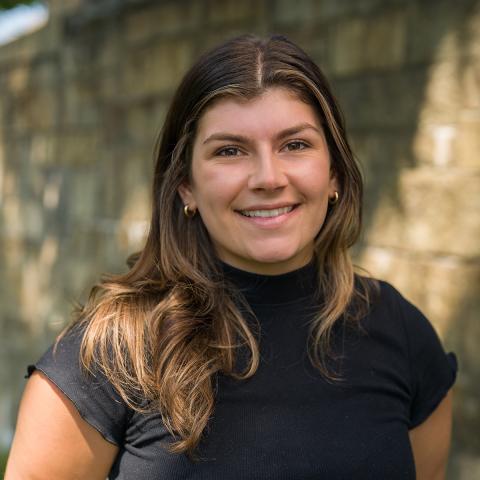
I attended Keene State College and received a bachelor of science in health science with a specialization in nutrition from Keene State College in 2020. Currently, I’m a graduate student in the MSDI program here at UNH with plans to become a registered dietitian. I’m a big sports fan, an experimental cook, and puzzle fanatic. In the future, I hope to be able to use my passion for nutrition to help children or athletes in a clinical or community setting.

I am currently completing a master’s degree in nutrition science with dietetic internship at the UNH. My career goal is to become a registered dietitian nutritionist and work as a food service director in a school district. Before moving to New England, I received a bachelor of science in nutrition from Texas A&M University. I chose to study nutrition because everyone eats. Nutrition gives me a practical way to help clients positively impact their health using something they do every day. In my free time, I am an avid amateur baker, dog mom and puzzle enthusiast.
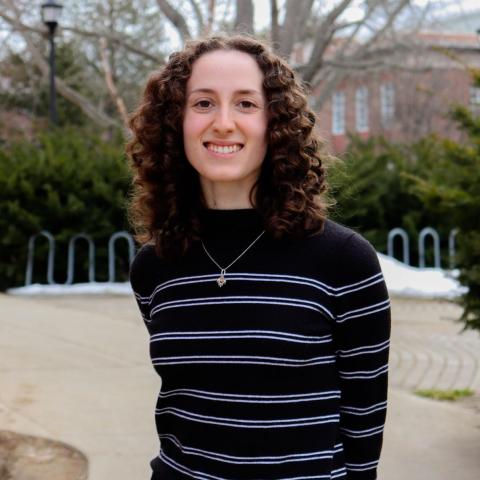
I graduated from Simmons University in Boston with a degree in nutrition: dietetics. I’ve wanted to be a dietitian since I was in high school because I’ve always loved food and the way it can contribute so much to health. I love trying new foods and learning about different foods around the world. I am currently interested in community nutrition and pediatrics, and I can’t wait to see what opportunities the dietetic internship has in store.
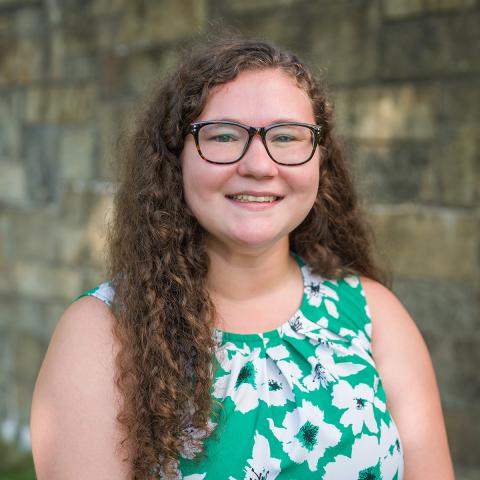
I’m a graduate student in the master of nutrition sciences and dietetic internship program at UNH. I began my undergraduate career at Simmons University in Boston but graduated with my bachelor’s in nutrition: dietetics from UNH. I love the outdoors as well as spending time learning new recipes and trying new restaurants. In the classroom I enjoy learning about diversity and inclusion in the field, as well as counseling practices.

Keirra Bartley
Advisor: Dr. Amy Taetzsch
MSDI Student

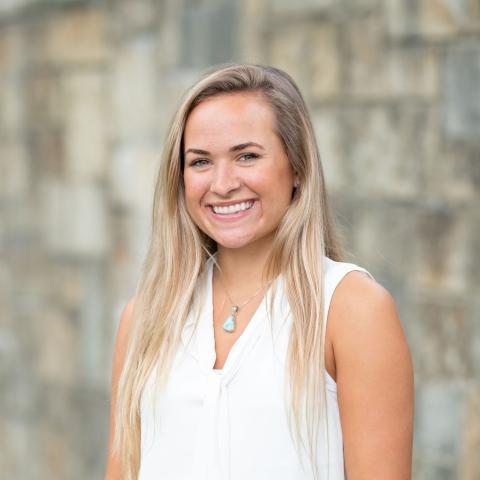


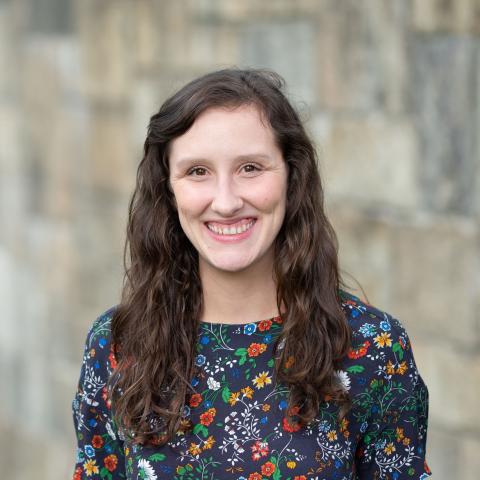


Ben Petri (MSDI Alumni Class of 2021)

Our Mission
The mission of the UNH Master of Science with Dietetic Internship (MSDI) Program is to cultivate effective entry-level Registered Dietitians Nutritionists (RDN) by providing high impact didactic and practicum experiences in the field of nutrition.
Our Vision
We envision that our MSDI graduates become dynamic, inclusive, and transformative RDNs that advocate for healthier food and nutrition policies and practices that promote overall wellness.
Our Goals
Goal 1: Prepare well rounded dietitians for entry-level positions in the field of nutrition and dietetics.
- Objective 1.1: At least 80% of program interns complete program/degree requirements within 32 months (150% of the program length).
- Objective 1.2: The program’s one-year pass rate (graduates who pass the registration exam within one year of first attempt) on the CDR credentialing exam for dietitian nutritionists is at least 80%.
- Objective 1.3: Seventy-five percent of program graduates take the CDR credentialing exam for dietitian nutritionists within 12 months of program completion.
- Objective 1.4: Of graduates who seek employment, 70% are employed in nutrition and dietetics or related fields within 12 months of graduation.
- Objective 1.5a: At least 80% of employed program graduates will rate themselves as prepared or well prepared by the internship to begin their career as a RDN.
- Objective 1.5b: At least 80% of employers will indicate that UNH MSDI graduates are prepared or well prepared for entry-level practice.
Goal 2: Prepare graduates to critically examine and evaluate research as it relates to the practice of dietetics and be able to translate those findings into evidenced-based education.
- Objective 1: 100% of students will evaluate current literature to inform the process of developing and answering an original research question that will be presented at a conference.
- Objective 2: At least 80% of graduates will report using evidenced based resources to inform their nutrition education.
Program outcomes data are available on request.
Food Repurposing Project
Students in the Master of Science in Nutrition and Dietetics volunteer in the Food Repurposing Project as part of their program requirements. This is an initiative to get wholesome, edible food that would otherwise end up in a landfill into the hands of local individuals and families with limited food access. It is a collaboration with the Department of Agriculture, Nutrition, and Food Systems, UNH Hospitality Services, and Gather, a non-profit food pantry and food distribution network based in Portsmouth, New Hampshire.
Read more about the Food Repurposing Project in the Fall 2021 issue of THRIVE.
Our Nutrition program welcomes students from all over the world. The Durham campus offers access to world-class faculty, research, and opportunity. An R1, top-tier research institution located in one of the safest college towns in the U.S., UNH is home to approximately 15,000 students from around the US and over 80 countries.
As a STEM-designated degree, international students will graduate from the M.S. in nutrition and dietetics program and be able to apply for a 24-month OPT STEM Extension to the 12-month Optional Practical Training Program (OPT) period, allowing you to work in the United States for up to 36 months after graduation with no additional visa requirement.
